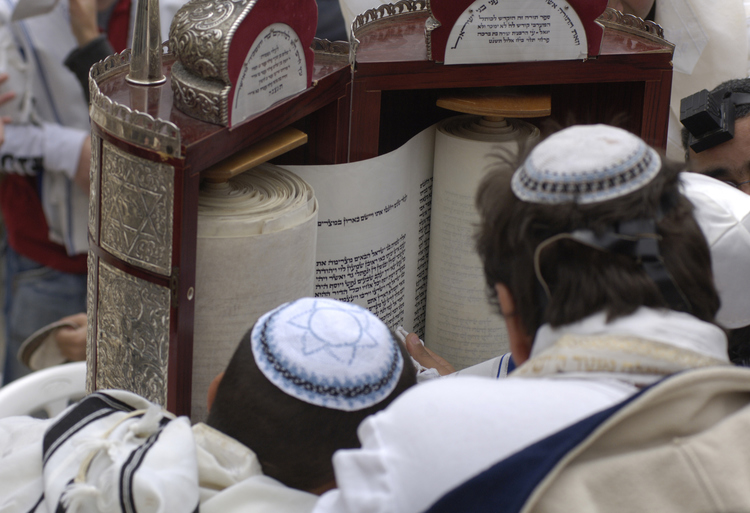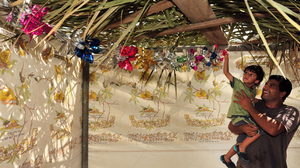
Do You Get a Black Moon?
What is a Black Moon, and why does it happen in December?
Often thought of as the eighth day of Sukkot, Shemini Atzeret is considered a time for Jewish people to renew their connection with divinity.

Shemini Atzeret marks a shift from the festivities of Sukkot to a more spiritual focus.
© iStockphoto.com/Alexander Donin
While this is not a public holiday in the United States, many Jewish-run organizations are closed on this date.
Shemi Atzeret is celebrated on the twenty-second day of the month of Tishrei in the Hebrew calendar, which usually falls between late September and early October in the Gregorian calendar. It is immediately followed by Simchat Torah.
On the first night after the holiday of Sukkot, the opening blessing Shehecheyanu is recited, signaling the start of Shemini Atzeret, which is both a new holiday and one that is connected to Sukkot.
Drawn from the Hebrew words for “eighth” (Shemini) and “assembly” (Atzeret), the name of this holiday is also related to the idea of atzor, "a pause or tarry.” Many scholars of Judaism believe this to be a time for people to pause or tarry and spend more time with God after the seven days of Sukkot celebrations during the previous week.
Some rabbinic teachers explain the nature of this holiday with a parable of a king who calls in his sons to stay with him for some days. When the time comes for them to leave, he asks them to stay on for yet another day, since it is so difficult for him to part from them. Some see a metaphor in this for the relationship between God and the Jewish people.
One feature of Shemini Atzeret is the prayer for rain and a good harvest that is traditionally recited as a reading from the torah scrolls on this date. Some scholars believe this tradition is related to the idea that Shimini Atzeret comes shortly after the Day of Atonement or Yom Kippur, so worshippers are asking for the gift of rain at a time when they are cleansed of sin.
In Talmudic literature, there is a concept that rain is metaphorical for God's justice and this benevolence is meted out on the basis of worthiness. With this in mind, Seimini Atzeret is seen as the best time to pray for rain.
In the Jewish diaspora—Jewish communities outside of Israel—an extra day is usually added to religious observances, with the exception of Yom Kippur, which lasts only one day worldwide, and Rosh Hashana, which is celebrated over two days in both Israel and the diaspora.
This custom has its roots in ancient times when the beginning of the months in the Jewish calendar still relied on the sighting of the crescent Moon following a New Moon.
The beginning of a new month was determined by the Sanhedrin, the supreme court of ancient Israel in Jerusalem. Once the date was published, messengers were dispatched to spread the news among Jews living abroad. Since this process took some time, it was decreed that Jews outside of ancient Israel were to observe every holiday for two days to make sure the rules and customs applicable to each holiday were observed on the proper date. This rule is still observed today.
Note: Jewish holidays begin at sundown the day before the date specified for the holiday.
| Year | Weekday | Date | Name | Holiday Type |
|---|---|---|---|---|
| 2019 | Mon | Oct 21 | Shmini Atzeret | Jewish holiday |
| 2020 | Sat | Oct 10 | Shmini Atzeret | Jewish holiday |
| 2021 | Tue | Sep 28 | Shmini Atzeret | Jewish holiday |
| 2022 | Mon | Oct 17 | Shmini Atzeret | Jewish holiday |
| 2023 | Sat | Oct 7 | Shmini Atzeret | Jewish holiday |
| 2024 | Thu | Oct 24 | Shmini Atzeret | Jewish holiday |
| 2025 | Tue | Oct 14 | Shmini Atzeret | Jewish holiday |
| 2026 | Sat | Oct 3 | Shmini Atzeret | Jewish holiday |
| 2027 | Sat | Oct 23 | Shmini Atzeret | Jewish holiday |
| 2028 | Thu | Oct 12 | Shmini Atzeret | Jewish holiday |
| 2029 | Mon | Oct 1 | Shmini Atzeret | Jewish holiday |
While we diligently research and update our holiday dates, some of the information in the table above may be preliminary. If you find an error, please let us know.

What is a Black Moon, and why does it happen in December?

When will the next comet be visible?

Why do mornings keep getting darker after the December solstice?

The first day of Sukkot marks the start of the Sukkot festival for Jewish communities in many countries, including the United States.